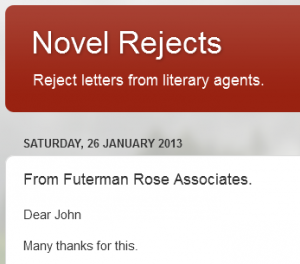 This story has generated a lot of controversy lately. From the Novel Rejects blog comes a rejection letter of an agent recommending a self-publishing firm in lieu of representation, likely for a fee.
This story has generated a lot of controversy lately. From the Novel Rejects blog comes a rejection letter of an agent recommending a self-publishing firm in lieu of representation, likely for a fee.
The writing is strong and the storyline intriguing. I have to tell you however, that agents are finding novels, even intelligently written commercial work like this, harder to place nowadays. Publishers are so subjective and only concerned with the bottom line.
What I can do is to suggest an organisation who, for a reasonably low fee will make the full arrangements to ensure a full Kindle publication of your work.
What is more, they will edit as well – obviously not a radically comprehensive edit – to a thoroughly presentable standard . Many Kindle books are going on at a later stage to traditional publication or Print on Demand.
Their fee is just £950 and you get a free Kindle as well. Let me know if you would like me to put you in touch with them.
The Writer’s Workshop adds:
I hope you don’t need me to tell to you that this is an APPALLING letter for any agent to send. Indeed, any ‘agent’ who sends a letter like this is no longer acting as a literary agent at all; but as some kind of pimp for the vanity publishing industry. Do I think that Oxford Provosts and High Court Judges fall for this kind of nonsense? Lord help us all if they do, but perhaps they do.
I’ve alerted the Association of Authors Agents about this letter and I strongly hope that they take action. Letters such as this are, in my opinion, emphatically contrary to the Association’s Code of Conduct (certainly in spirit, and probably in letter too.) I’ll let you know if there are developments.
Personally, I have less of a problem with this. The issue isn’t necessarily recommending a self-publishing firm, it’s the quality of the firm. £950 is an absurd fee for Kindle publication. But what if, for example, the agent recommended Bookbaby, where writers get to keep all of their rights and royalties. The agent would get $25, or something, for every referral, rather than the $100 per $1000 contract offered in the scenario above. Would this still be corrupt if the agent was offering a better service than an Author Solutions company?
My answer is yes – this is fine. This has the potential for exploitation, certainly. What if agents suddenly were making more money sending writers to a self-publishing company than they were actually representing books? They’d stop representing books entirely. Well, then that’s what the market dictates. In this scenario, self-publishing has become more viable than traditional publishing and agents need to put food on the table as well. If the self-publishing firm they’re recommending is totally above board, what’s the problem?
People often talk about how mainstream publishing (or music) doesn’t adapt to the new technology, and holds for dear life to the old model. Here’s an example of an agent adapting to the new marketplace – not well, mind you, but trying something new. If books are “harder to place nowadays” (true), then the agent isn’t making any money either.
People are quick to point out how naive or inexperienced writers will get suckered into a bad contract. “Please think of the writers!” This is their fault. Whether it’s an Author Solutions scam, or a better BookBaby deal, it’s the author’s fault if they sign on the dotted line before doing their research. The main thing in the agent’s email is he says it’s “just” £950 – misleading. Otherwise – agent recommends a service where an author keeps all their royalties and rights and gets help designing a book, I say good. It’s just a recommendation. Maybe the agent will make money, probably they won’t.
The self-publishing community is often quick to scream scam – because there are many scams in the self-publishing universe. But as self-publishing means “author pays him/herself” there will necessarily have to be money changing hands. Self-publishing firms aren’t all awful, even if you can technically upload a book to Kindle for free – there’s cover design, editorial, and conversion that also needs to be factored in. These things cost money. If, as JA Konrath surmises, traditional publishing is going to fade into obscurity, then models like this will become the norm. Agents will become self-publishing brokers more than representatives. Isn’t this what people want – for self-publishing to be the go-to source for publishing?
A writer isn’t being taken advantage of if he or she is being recommended a good service. All we know of this agent is that he’s offering an “organisation,” not what that organization is – it’s probably Author Solutions, but it’s not said explicitly. If he’s funneling to a better service, he’s not being a “pimp for the vanity publishing industry” any more than self-publishing is vanity publishing. The issue some take with this seems to be suggesting that the agent is offering a lesser option. He’s slumming. No. Self-publishing is viable. As it becomes more and more viable, as ereaders proliferate, scenarios like this will become more common – fighting this isn’t fighting corruption, it’s fighting the inevitable.
Get an Editorial Review | Get Amazon Sales & Reviews | Get Edited | Publish Your Book | Enter the SPR Book Awards | Other Marketing Services






















Agreed. The roles are changing. An agent in the book world used to sit high and mighty in bed with the traditional publishing houses, acting as kings and queens of the literary universe. Then… boom! Anyone could break through and publish, and be successful on their own.
So an agent is simply adapting to the current change. Evolving is probably the better word. Surviving actually probably being the best way to describe it. The easy dollars stopped flowing in, and like everyone else they have to feed their families, even if it means going below deck below first-class and mixing it up with those third-class self-publishers, or “new money”.
Unfortunately for those that choose to do so, they will probably find that while some might take them up on this disingenuous scheme, over time, the vast majority will see through them and reject their offers.
I know that I am not the only one who has been violated by Author Solutions. In 2010 I started off trying to get my book published. Since then I have paid out £10,000.- in fees and still my book is not published. This morning 14. August 2014 a so called senior representative called me saying that she had been informed that as my book was not yet published (after 4 years with Author Solutions) and that it was her job to help me. For the sum of £1,500.- she could get my book in some sort of publishers catalogue and onto book shelves because that was her job and that she was a senior representative as well and she was only thinking of me and I was her greatest concern!!!! How many many times have I heard this. This time I lost my temper and told her I thought I might invest my money in taking Author Solutions to court. She ended the conversation immediately.